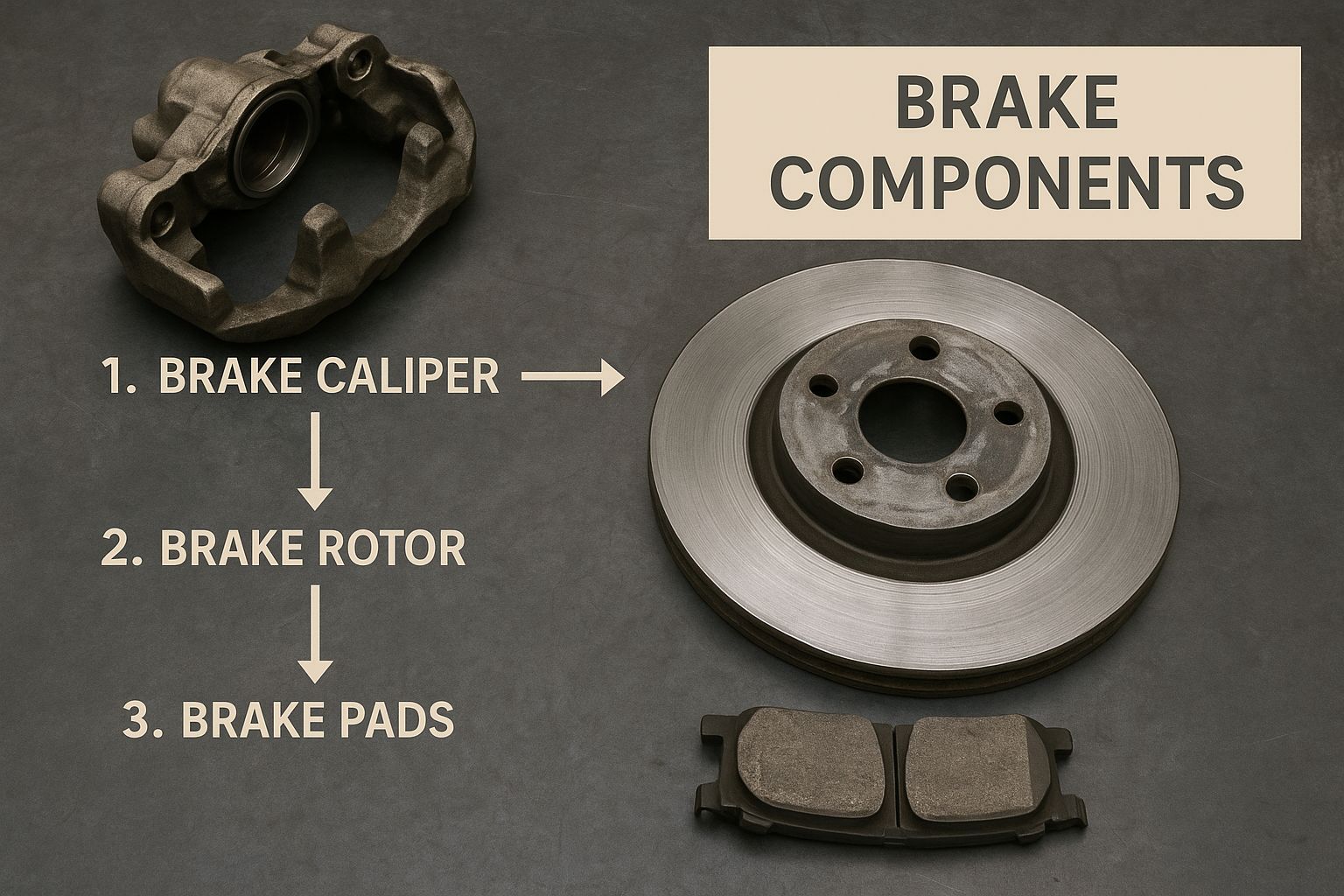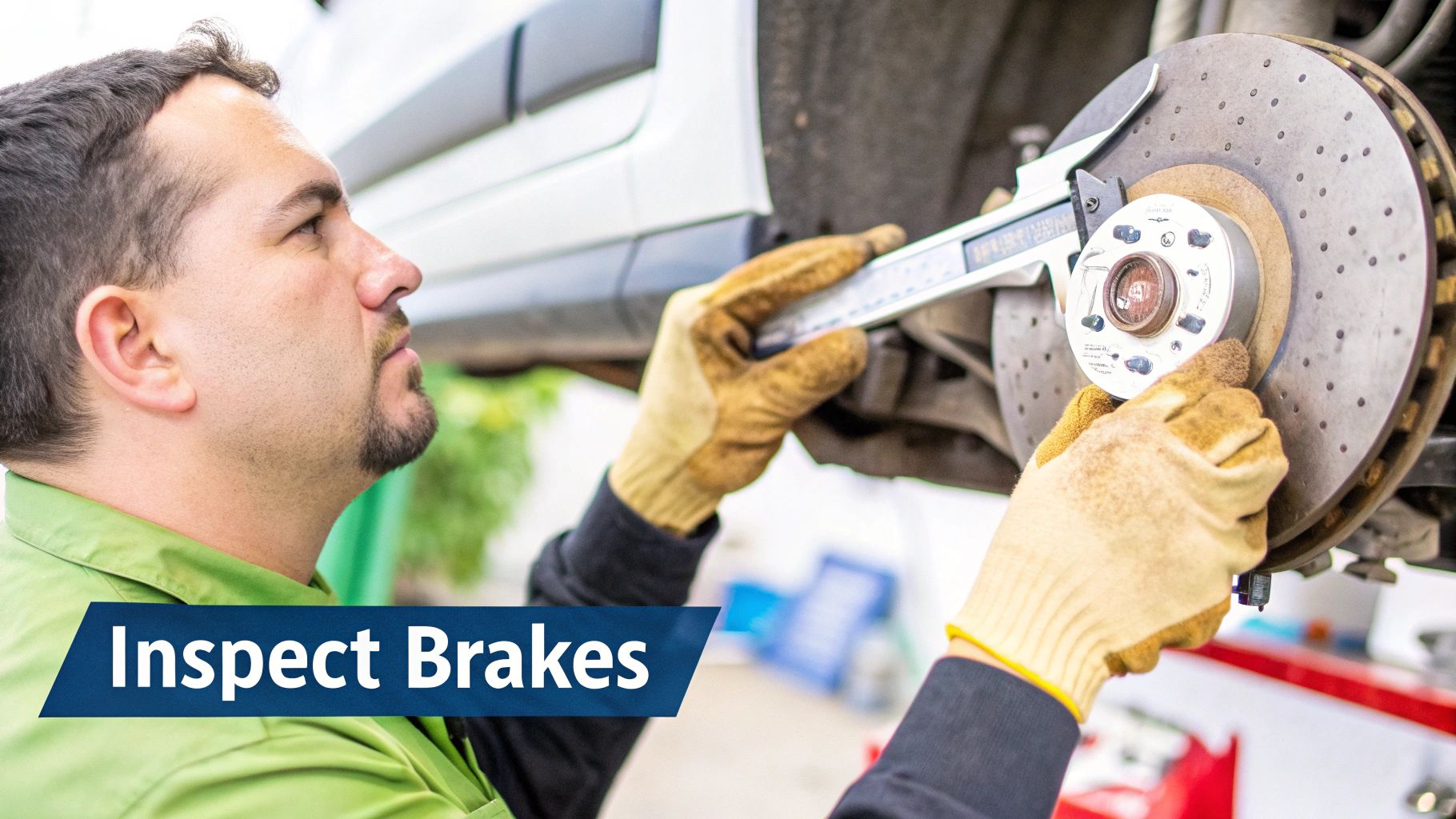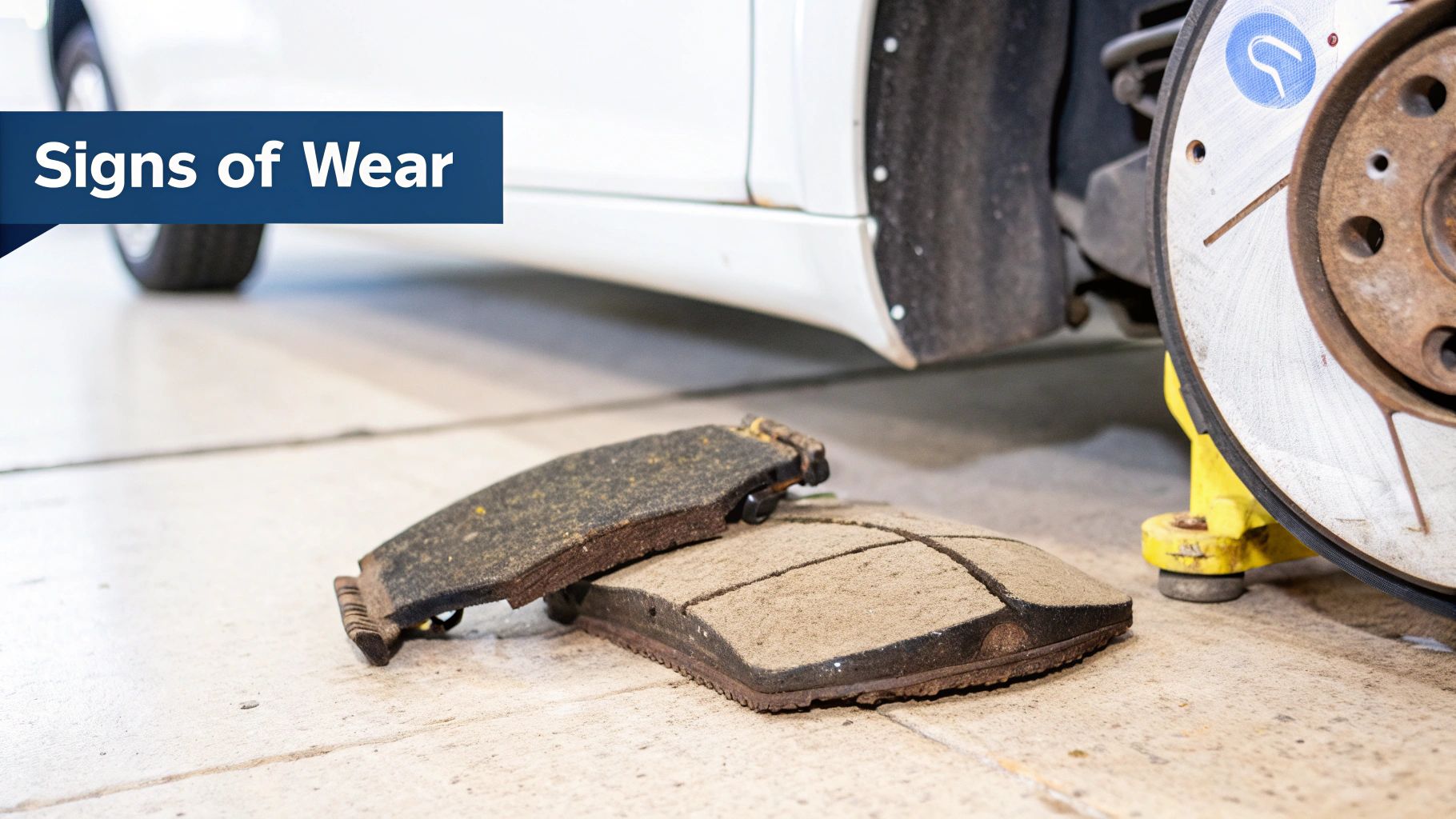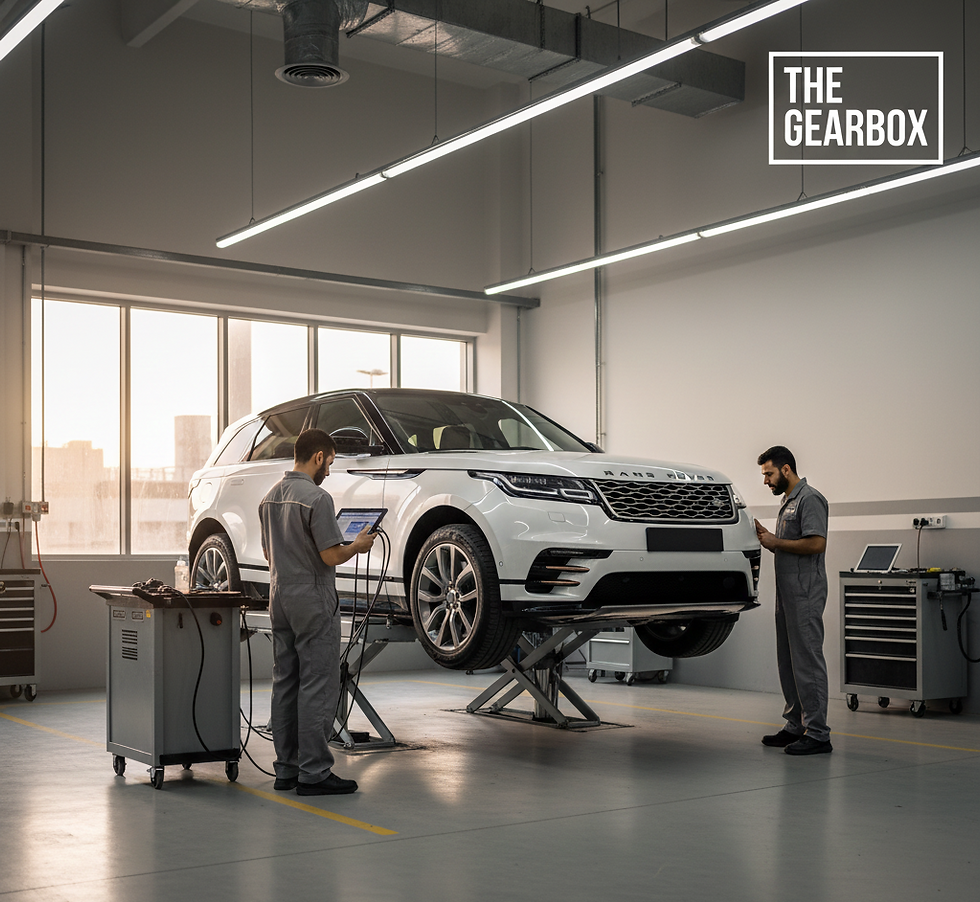Your Guide to Expert Car Brake Maintenance
- The Gearbox Auto Services
- Jul 14, 2025
- 13 min read
A high-performance braking system isn't just a feature—it's arguably the most critical safety system in your entire vehicle. When we talk about proper car brake maintenance, we're not just talking about fixing things when they break. It's about proactive, regular checks of every single component to ensure they're ready to perform flawlessly when you need them most.
Getting to know the basics of your brakes gives you the power to spot early warning signs, long before a small issue snowballs into a serious safety risk.
The Fundamentals of Your Braking System
Every time you press the brake pedal, you're kicking off a complex chain reaction. That simple movement from your foot is instantly translated through a system of hydraulic and mechanical parts, generating immense force to bring your car to a safe, controlled stop. This is especially true for precision-engineered vehicles, where stopping power has to perfectly match engine performance, whether it's a high-revving Ferrari, a stately Bentley, or a powerful Dodge.
A proactive approach to car brake maintenance isn't just a good idea; it's non-negotiable for your safety. It means looking for wear and tear before it compromises your ability to stop. This is exactly why our Major and Minor Services always include a comprehensive inspection of the entire braking system.
Key Components and Their Roles
Understanding the main parts of your braking system helps you appreciate just how intricate it is and why professional care is so important.
Here’s a quick reference guide to the primary parts of your car's braking system and what they do.
Brake System Components and Their Functions
Component | Primary Function | Common Sign of Failure |
|---|---|---|
Brake Pads | Create friction against the rotors to slow the wheels. | Squealing, grinding noises, or a brake warning light. |
Brake Rotors (Discs) | The metal discs that the brake pads clamp onto. | Vibration in the steering wheel or pedal when braking. |
Calipers | The hydraulic clamps that hold the pads and press them against the rotors. | Car pulls to one side when braking; uneven pad wear. |
Brake Fluid | The hydraulic fluid that transfers force from the pedal to the calipers. | A "spongy" or soft brake pedal feel. |
Each of these components is absolutely vital. For instance, worn-out pads on a Porsche can quickly ruin a set of expensive rotors. A failing caliper on a Chevrolet could lead to a sudden and complete loss of braking pressure. It's this interconnectedness that makes a holistic approach so critical, which is why our dedicated Brakes Services address every single element, not just the most obvious ones like the pads.
The growing emphasis on reliable braking systems is even reflected in market trends. The automotive braking market in the Middle East and Africa is projected to surpass USD 360 million by 2029. This growth is driven by the rising number of vehicles on the road in countries like the UAE, which naturally increases the demand for dependable brake components and expert service.
A well-maintained braking system isn't just a recommendation—it's a critical responsibility for every single driver. For brands like Lamborghini or Rolls Royce, where performance and safety are intertwined, nothing less than the highest standard of care will do.
Our team has deep expertise in the sophisticated braking systems found across a wide range of premium European and American vehicles. Whether you drive a Mercedes, BMW, Cadillac, or Ford, our technicians use modern equipment for everything from routine Maintenance and Repair to advanced Scanning and Diagnostics.
For a deeper dive into overall vehicle care, you can read our guide on how to maintain and repair cars in Dubai. We're here to make sure your vehicle gets the expert attention it deserves.
What Are Your Brakes Telling You? Listening for the Signs of Wear
Your car has its own way of telling you something's wrong, especially when it comes to the brakes. Paying attention to the sounds you hear and the way the pedal feels under your foot is the first step in smart car brake maintenance. It’s about catching small issues before they become big, expensive problems.
Think of it as learning your car's language. Different sounds and sensations point to different problems, giving you a head start on figuring out what needs a mechanic's attention.
This is exactly why our professional Scanning and Diagnostics service is so crucial. Before we even pick up a wrench, we perform a thorough diagnosis to pinpoint the exact source of the trouble. This approach saves you money and gets you back on the road faster, without replacing parts that are still in good shape.
Common Brake Noises and What They Mean
Let's break down the most common symptoms. If you hear a high-pitched squeal when you first hit the brakes, that’s usually the built-in wear indicator on your brake pads. It's a little metal tab designed to make noise when the pads are getting thin. It's an early warning sign—don't ignore it.
What if that squeal progresses to a harsh, metallic grinding? Stop driving immediately and get your car checked. That grinding noise means your brake pads have worn down completely. Now, it’s metal grinding against metal—the brake caliper against the rotor. This is not only incredibly dangerous because it drastically reduces your stopping power, but it also causes severe damage that's far more costly to fix.
Another major red flag is a brake pedal that feels soft, spongy, or sinks toward the floor. This usually means there's air or moisture in the hydraulic system or, worse, a fluid leak. Your foot pressure isn't being transferred correctly to the brakes, creating a serious safety hazard that requires immediate Maintenance and Repair.
This image shows the key parts involved and helps visualize where problems like worn pads or damaged rotors can occur.

Knowing how these components fit together makes it easier to understand what’s happening when you hear those tell-tale sounds.
How Different Vehicles and Driving Habits Affect Brake Wear
Brakes don't wear out the same way on every car. A heavy-duty GMC truck that spends its life towing trailers puts enormous heat and pressure on its brake pads and rotors. On the flip side, a zippy MINI Cooper used for stop-and-go city driving will see more frequent, but less intense, brake use.
That's why a cookie-cutter approach to Brakes Services just doesn't cut it. Our inspections are always tailored to your specific vehicle and how you drive it, whether you're behind the wheel of a rugged Jeep or a sophisticated Audi. We're a full-service workshop, so whether you need AC Services, a Premium Oil Service, or more intensive work like Engine Repair or Transmission Repair, we apply that same vehicle-specific expertise to every job.
The Critical Role of Brake Fluid in Performance
When you think about car brake maintenance, your mind probably jumps straight to the pads and rotors. They get all the glory. But the real unsung hero of your braking system is the brake fluid. This hydraulic fluid is what takes the gentle pressure from your foot and multiplies it into the incredible force needed to bring your vehicle to a stop.
Put simply, without clean, high-quality brake fluid, even the most powerful brakes are nothing more than dead weight.
This isn't just any old liquid. Brake fluid is hygroscopic, a fancy way of saying it loves to absorb moisture right out of the air. Over time, this becomes a serious problem. Even 3% water contamination can drastically lower the fluid's boiling point. Under the intense heat of heavy braking, this water can turn to vapor, creating air pockets in your brake lines. The result? A terrifyingly soft, spongy pedal and a major loss of stopping power right when you need it most.

This is precisely why a periodic brake fluid flush is an essential, non-negotiable part of our Major and Minor Services. We’re not just topping it off; we're completely purging the old, tired fluid and replacing it with fresh, high-performance fluid to restore your vehicle's safety.
Choosing the Right Fluid Specification
Using the wrong brake fluid is a mistake you don't want to make—it can cause serious, expensive damage to your system. You'll generally come across three main types: DOT 3, DOT 4, and DOT 5.1. They are all glycol-based but have different boiling points and characteristics.
DOT 3: This was the go-to for many older passenger vehicles.
DOT 4: With a higher boiling point, this is the standard for most modern European and high-performance cars from manufacturers like BMW, Porsche, and Mercedes.
DOT 5.1: This fluid offers even greater performance but typically needs to be changed more frequently.
Pouring a lower-spec fluid into a high-performance machine like a Maserati or Bentley is asking for trouble. It can cause brake fade to set in at the worst possible moment. That’s why our Brakes Services exclusively use premium fluids that meet or exceed the exact manufacturer specifications for your vehicle, whether it’s a rugged Jeep or an ultra-refined Rolls Royce.
The importance of quality brake fluid isn't just something we preach in the shop; it's a massive global market. The automotive brake fluid market in the Middle East & Africa was valued at roughly USD 850 million and is projected to hit USD 1.11 billion by 2030. Disc brakes, which rely heavily on this fluid's performance, hold about 45% of that market.
When to Schedule a Brake Fluid Flush
So, how often should you do this? As a solid rule of thumb, we recommend a complete brake fluid flush every two years or 40,000 kilometers. Of course, this isn't set in stone. A Lamborghini seeing track days will need its fluid changed far more often than a Ford that's only used for the daily school run.
Putting this service off is a gamble with your safety. If you peek into the reservoir and see dark, murky fluid, it’s a clear sign of contamination that needs immediate attention. As part of our comprehensive Maintenance and Repair checks, our technicians will test the moisture content of your brake fluid. If we find it's compromised, we’ll strongly advise a flush to get your braking system back to factory-spec performance and give you complete confidence on the road.
What We Do: Comprehensive Brake Repair and Maintenance
Figuring out you have a brake problem is the first step. The next, and most important, is finding someone you trust to fix it right. This is where we come in. We don't just identify issues; we provide proven, reliable solutions for your vehicle's most critical safety system.
Our approach to car brake maintenance and repair is exhaustive. We handle everything from the routine jobs that keep your daily driver safe, like replacing brake pads and rotors, to more complex work like overhauling seized calipers or replacing compromised brake lines. Our technicians have the experience and the right tools to restore your car's stopping power back to factory-spec.

Maintenance vs. Repair: What's the Difference?
It’s easy to use these terms interchangeably, but in the shop, they mean very different things. Knowing the distinction helps you understand what your car needs and why.
Maintenance is all about being proactive. Think of it as preventative care: detailed inspections, cleaning components, lubricating caliper pins, and flushing your brake fluid. The whole point is to catch small issues before they become big, expensive problems.
Repair is reactive. This is what we do when a part has worn out or failed completely. It involves replacing components like brake pads and rotors, fixing a leaky master cylinder, or sorting out any other issues we find during an inspection.
We always start with a thorough check—it's a core part of our Major and Minor Services. This allows us to give you a straight, honest assessment of what your vehicle actually needs, so you’re never paying for unnecessary work.
Expertise That Spans Every Major Brand
Whether you're behind the wheel of a rugged Land Rover, a sleek Jaguar, or a dependable Volkswagen, your vehicle’s braking system has its own unique demands. Our technicians have spent years working on a huge range of premium European and American brands. From the high-performance setups in a Porsche to the complex electronics in a new Audi, we know exactly what we’re looking at.
One thing we’ve learned over the years is that a car’s systems are all connected. For example, worn suspension parts can actually make your braking distance longer and cause your tires to wear unevenly. That’s why we always look at the bigger picture, not just the single component you brought the car in for.
This holistic philosophy guides everything we do. Our Suspension Services go hand-in-hand with our brake work to make sure your vehicle handles and stops with perfect control. If a brake warning light turns out to be an electrical gremlin, our advanced Scanning and Diagnostics will pinpoint the source. We also offer Battery Services as weak batteries can cause electronic brake faults. For complete car care, we are also experts in Engine Repair, Transmission Repair, and even full Body Work and Paint Services. To see the full scope of what we can do for your brakes, you can learn more about our dedicated Brakes Services.
Advanced Diagnostics for Modern Electronic Braking Systems
The smooth, powerful feel you get from the brakes in a modern luxury car is no accident. In high-performance vehicles from brands like Audi, Rolls Royce, and McLaren, traditional mechanical parts work hand-in-hand with a whole network of electronic safety systems. These behind-the-scenes guardians—like the Anti-lock Braking System (ABS), Electronic Brakeforce Distribution (EBD), and traction control—are constantly working to keep you safe.
But all that sophistication means that when a problem pops up, a quick visual check just won't cut it anymore. That's precisely where our specialized Scanning and Diagnostics services come in. When a warning light appears on your dash, it's the car’s way of telling you there's a fault that needs a professional eye to decode.
Our technicians plug state-of-the-art diagnostic equipment directly into your vehicle’s computer, allowing us to "talk" to your car and pull the specific error codes logged by the braking system.
Interpreting the Digital Language of Your Brakes
An error code is far more than just a number; it's the first clue that points our team in the right direction. For instance, an ABS fault code on a BMW or Mercedes could mean anything from a faulty wheel speed sensor to an issue with the hydraulic control unit. A basic, off-the-shelf code reader might just give you a generic "ABS Fault" message, but our advanced tools deliver the granular data we need to pinpoint the root cause with surgical precision.
This is absolutely crucial because these systems are so deeply intertwined. In a modern Jaguar or Land Rover, what seems like a brake fault can sometimes be traced back to the engine or transmission computers. Our deep expertise in both Engine Repair and Transmission Repair gives us a holistic view of how these systems communicate, letting us track down complex electronic issues that other shops might overlook.
Guesswork is a dangerous game with today's advanced braking systems. Precise diagnostics mean we replace only the components that are actually faulty, which saves you time and money while ensuring your safety features are restored to perfect working order.
From Diagnosis to Complete Resolution
Once we’ve zeroed in on the exact problem—whether it's a finicky sensor on a Porsche or a software bug in a Bentley—we move on to the necessary Maintenance and Repair. Our comprehensive Brakes Services cover every single aspect of these modern electronic systems, focusing not just on the mechanical parts but on restoring full electronic functionality.
We routinely handle complex tasks that go well beyond a standard brake job. This includes:
Recalibrating steering angle sensors after a wheel alignment, which is critical for the traction control to function correctly.
Electronically retracting brake calipers on vehicles with electronic parking brakes, a feature on many newer Volkswagen and Ford models, to safely perform pad and rotor changes.
Bleeding ABS modulator units using very specific, manufacturer-recommended procedures to ensure every last bit of air is purged from the hydraulic system.
Our commitment is to offer a dealership-level experience without the dealership price. By blending our team's deep knowledge of luxury brands with the latest diagnostic technology, we make sure every electronic safety feature in your vehicle—from a Maserati to a Hummer—performs exactly as its engineers designed it to.
Common Questions About Car Brake Maintenance
Even with a good guide, it's natural to have questions about your car's brakes. And you absolutely should—they're the most critical safety system on your vehicle. Let's walk through some of the questions we hear all the time from drivers, so you can feel more confident about keeping your car safe.
How Often Should I Get My Brakes Inspected?
As a solid rule of thumb, we tell most drivers to get a professional brake inspection at least once a year or every 20,000 kilometres. This is a non-negotiable part of our Major and Minor Services for a reason.
But that's just a baseline. Your car and how you drive it really dictate the true schedule.
High-Performance Cars: If you're behind the wheel of a Ferrari or a Porsche, you're working with brakes designed for serious stopping power. We strongly recommend a check every six months to maintain that peak performance and safety.
City Driving: A lot of stop-and-go traffic is tough on brakes. If that sounds like your daily commute, more frequent inspections are a smart move.
Heavy-Duty Use: Towing with a Dodge or Ford truck? You're putting immense strain on your braking system, and those components need to be checked more often.
What’s the Real Difference Between OEM and Aftermarket Brake Pads?
Picking the right brake pads is about more than just price; it's about preserving the feel and performance your car was built for, whether that's a BMW, Cadillac, or Chevrolet. The choice comes down to their origin and what they were designed to do.
OEM (Original Equipment Manufacturer) pads are the exact same parts your car was fitted with at the factory. The manufacturer designed them to provide a specific, balanced mix of stopping power, quiet operation, and lifespan.
Aftermarket pads, on the other hand, are made by different companies and give you a wider range of choices. Some are engineered for aggressive track performance, while others might be a more budget-conscious option. Our job is to help you navigate these options. We'll look at your car, listen to how you drive, and recommend the best fit—safety is always the bottom line. For example, German cars have very particular engineering needs, which you can learn more about by reading these basic maintenance tips for German cars.
Can I Just Replace the Pads and Not the Rotors?
Technically, you sometimes can, but it’s rarely a good idea. We almost always advise against it. Think of brake pads and rotors as a team that wears down together. When you put fresh, flat pads onto a worn, uneven rotor, you're asking for trouble.
This mismatch can cause your new pads to wear out incredibly fast, create annoying noises, and give you shaky, inconsistent braking. For the best safety and performance—especially on premium vehicles like a Range Rover or Aston Martin—we replace pads and rotors as a matched set.
Before making any recommendation, our technicians will break out the micrometers to measure your rotor thickness and check for any warping. You'll get an honest assessment based on safety standards, not just what’s technically possible.
Why Are My New Brakes Squeaking?
Don't panic just yet. A bit of light squeaking for the first few hundred kilometres after a brake job is usually normal. This is the "bedding-in" period, where the new pads are mating to the rotor surface and creating an even layer of friction material.
However, if that squeak is loud, constant, or turns into a grinding sound, something's not right. It could be a simple lubrication issue or something more serious like an installation error. If the noise doesn't go away, bring your car back to us at The Gearbox Auto Services immediately. We need to get our eyes on it and make sure everything is working exactly as it should.
At The Gearbox Auto Services, we provide expert solutions for all your vehicle needs, from routine maintenance to complex repairs. Trust our team of expert mechanics and modern equipment to deliver a dealership experience at affordable prices. Visit us to book your service today!




Comments